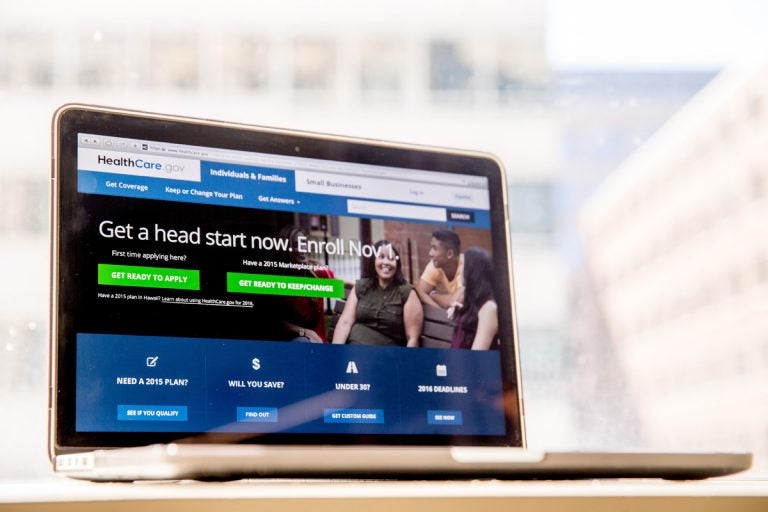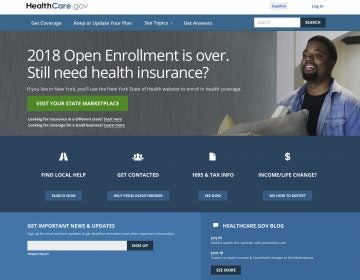Pennsylvania gears up for health insurance open enrollment with campaign of its own
The window to sign up for individual health insurance through the Affordable Care Act's online marketplace begins Wednesday, Nov. 1.

In this Oct. 6, 2015, file photo, the HealthCare.gov website, where people can buy health insurance, is displayed on a laptop screen in Washington. (Andrew Harnik/AP Photo, File)
The window to sign up for individual health insurance through the Affordable Care Act’s online marketplace begins Wednesday, Nov. 1, amid fewer federal resources to help people sign up and increased confusion over the law itself. Still, area health groups are gearing up.
In Pennsylvania, acting insurance commissioner, Jessica Altman, wants to be clear about one thing: “Right now, nothing has changed,” Altman said. “You should go on the marketplace, should shop just like you have in previous years.”
What is different this year, is the length of time people have to sign up. The window to enroll closes Dec. 15, compared to Jan. 31 last year. The federal government’s website healthcare.gov is where people can sign up, but the hours are more limited this time around for when people can use it.
Altman worries about the confusion, especially since federal advertising is a lot less this year and repeal and replace has dominated a lot of news headlines.
“Our primary fear is making sure people understand the ACA is still law, and that means both that all the benefits and protections that are part of that are still available,” she said. “It also means that the requirement that individuals do purchase health insurance or else they may have to pay a penalty is still in place,” Altman said.
Federal resources to help people through the enrollment process have been cut by a third in Pennsylvania, decreasing from about $3 million last year to $2 million this year (in New Jersey, funding went from nearly $2 million to $720,000, while in Delaware, federal funding remains steady).
In response to the shift, Altman’s department has put together an educational campaign of its own using about $100,000 from its department budget. That includes an online tool through the state’s website, where people can directly compare insurance plans both on and off the marketplace.
Insurance, hospital and other consumer groups are also organizing outreach efforts. The Pennsylvania Health Access Network is putting together a map with different enrollment assistance resources throughout the state. It also runs a consumer help line: 877-570-3642.
Marketplace plans are being offered in all 67 counties in Pennsylvania. In Philadelphia, Independence Blue Cross is the only insurer participating in the marketplace. Altman says the premiums on plans are going up a lot this year — by about 30 percent — but most people, 80 percent, will then qualify for bigger subsidies to help pay for that coverage. In other words, most consumers won’t experience the impact.
“We’re going to see people get more financial assistance than in past years, so I recommend people go, take a look, explore these options and look at one of these search tools because there may be better options than in past years,” she said.
In some instances, a plan that offers more coverage — a gold plan — might be cheaper than a silver baseline plan. People can only access that financial assistance, though, if they sign up through the government website, healthcare.gov. Altman says last year, some companies selling insurance off the marketplace did not make that clear to people.
For people who don’t qualify for subsidies to help purchase a plan, Altman says they might find a better deal outside the marketplace. Such plans must still cover essential benefits, as required under the Affordable Care Act, and people can’t be charged more or denied that coverage. State regulators do caution against “Short-Term Limited Duration Plans.” This type of coverage is limited, it doesn’t meet minimal essential coverage requirements, people can be charged more based on their health status, and it does not fulfill the insurance requirements under the IRS. In other words, a person with this type of coverage may still face a fine for not having health insurance.
Already, some 400,000 Pennsylvanians have marketplace plans. Altman says it’s important for them to review their coverage during open enrollment, too, in case anything changes or there’s a better deal. If an insurer has stopped offering a certain health plan, the company is to send people a notice. Without further action, a person will be matched with an alternate plan.
The main website with enrollment information for Delaware residents is choosehealthde.com. One change in the state this coming year is that Aetna will no longer offer plans. That means about 11,000 people who had plans through that company will have to go to the online marketplace and enroll themselves in a Highmark Blue Cross Blue Shield plan, according to Vincent Ryan, a senior advisor in the Delaware Department of Insurance.
In New Jersey, meanwhile, consumer groups are launching a website that will have up to date enrollment assister locations and other resources.
WHYY is your source for fact-based, in-depth journalism and information. As a nonprofit organization, we rely on financial support from readers like you. Please give today.




